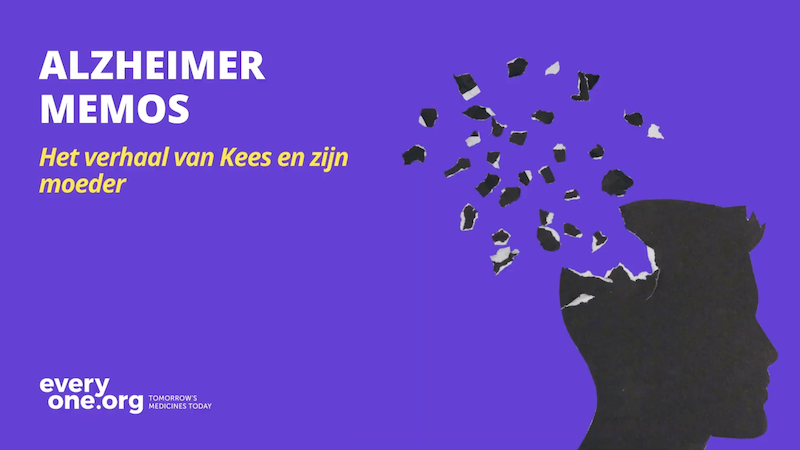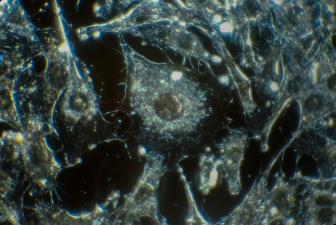Finding meaning in the small things: The story of Kees and his mother
Last updated: 02 December 2024

You can legally access new medicines, even if they are not approved in your country.
Learn howIn this heartfelt conversation, Kees opens up about his personal journey caring for his mother, who was diagnosed with Alzheimer’s. Reflecting on the emotional challenges and difficult decisions faced by families dealing with this condition, Kees shares the ups and downs of navigating the disease over the years. His story highlights the importance of being present for loved ones, even when the path forward seems uncertain, and offers valuable insights into the realities of living with Alzheimer’s.
Everyone.org:
Could you share a bit about your family’s experience with Alzheimer’s?
Kees:
My mother passed away nearly exactly two years ago from Alzheimer's. It was severe, so much so that she no longer recognized anyone. It was incredibly difficult, especially toward the end, to make any connection.
Even when you would stroke her back, the sense of touch remained, but you couldn't tell if she liked it or not. It was like there was no response anymore, and that was the last experience we had with her as a family.
She lived to 83, and I think it started around when she was 67. She lived nearby, which was very convenient at first. We could visit in the evenings for a coffee and a quick check-in, which worked well for a time. But then things started to decline. After a few years, she moved to assisted living, and that went well for a while. Eventually, she ended up in a nursing home, where she passed away.
Everyone.org:
Was your mother initially diagnosed by the GP or another specialist?
Kees:
I don't remember much from that initial stage, but I do recall us going to the GP together, then going to the hospital and seeing a geriatrician, a geriatric nurse, who confirmed the Alzheimer's diagnosis. They helped us a lot.
Everyone.org:
Were you or your mother ever offered an alternative, such as a clinical trial or a medicine from abroad?
Kees:
Not that I remember. An option like that needs to also be on the radar of the healthcare professional - e.g. if they are involved in a clinical trial. We never really considered seeking a second opinion or going to another hospital. We stayed with the local hospital, and that worked fine for us.
Everyone.org:
If you had been offered treatment alternatives, would you have appreciated that?
Kees:
I’ve looked into Alzheimer’s myself, and there is still a lot of uncertainty about finding something that really works. Fifteen years ago, there was nothing. Now, there’s a little more, but still not much. So, at the time, we never really considered clinical trials or looking into more experimental treatments.
Everyone.org:
If alternative treatments had been an option, what factors would you have considered when making a decision to go for one?
Kees:
My first criterion would be whether we’ve really run out of options. Then I would consider whether the alternatives would be potentially curative or simply palliative care? If there would be something that could be curative, I’d definitely consider it, but it would always be about weighing the risks and the benefits. It’s a tough decision, especially when you’re emotionally involved.
Everyone.org:
How did your relationship with your mother change as her condition progressed?
Kees:
My mother actually became a bit sweeter during the early stages. She would give a lot more compliments than before. That wasn’t such a bad period. It was still challenging, but she wasn’t in urgent need of care at that point. As time passed, her condition worsened, and she became more agitated. It became clear she wasn’t happy anymore. She was often restless, wanting to move around and pack her things. And at some point, there wasn’t much more we could do other than be there for her. Which may well be enough.
Everyone.org:
Which strategies helped your family in dealing with this difficult situation?
Kees:
You start realizing that you can’t come to your mother to receive something from her anymore. That is no longer possible. It becomes about being there. And even if it doesn’t seem meaningful to you, simply being there is meaningful, because it is about the other person. Looking back, I see that as a somewhat nice aspect of the situation.
Everyone.org:
How did the family dynamics change in terms of roles and responsibilities, in the context of caring for your mother?
Kees:
I'm the eldest, so I naturally took on the responsibility for handling the finances and the logistics. My sisters handled other things like clothing. We didn’t really plan things out in detail, but we coordinated to make sure we weren’t all visiting at the same time. That made it easier for my mother.
Everyone.org:
Has your understanding of Alzheimer’s changed over time? Did you have any misconceptions about it?
Kees:
When you’re faced with it, you start to educate yourself about what can be done. The care my mother received, including medication, was very good. We had no complaints.
I think the most insightful thing is that when my mother would ask the same question repeatedly—like about my father’s health, or whether he was still alive—you don’t always correct her immediately. Instead, you shift the conversation. If she asked, 'Where is my husband?', I would ask her, 'Who was Kees to you?' That way, you can keep the conversation meaningful without focusing on facts that don’t matter as much anymore. It's about keeping a connection to the past without fighting against the confusion.
Everyone.org:
Are you afraid of Alzheimer’s for yourself? And how do you deal with that?
Kees:
Yes, but not more afraid than from anything else that is serious. There's not much you can do about it. My grandmother used to say, 'You suffer the most from the suffering that you fear.' But that’s not entirely true. The Alzheimer's risk factors have shifted over time. Some things that were thought to be major risk factors, like genetics, are actually less significant now. You can still do things to reduce the risk, like taking care of your health.
Everyone.org:
What advice would you give to other families who are confronted with the Alzheimer’s diagnosis?
Kees:
As time goes on, you grow a bit with the disease. It doesn’t go from bad to worse overnight. In my mother’s case, it took 15 years. You adapt and develop alongside it. It’s not easy, but it’s about finding a way to move forward, not pretending everything is fine, but still finding meaning in the connection, no matter how small it is.
—-
If you or a loved one are dealing with an Alzheimer’s diagnosis, you are not alone. Draw insights, experiences, and solace, from others’ stories.
And if you need help finding out about participating in clinical research on Alzheimer’s, or getting access to Alzheimer’s medicines unavailable in your country, get in touch with Team Everyone. We’re here to help.




